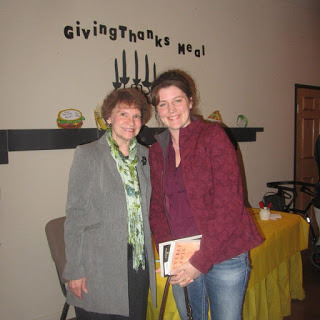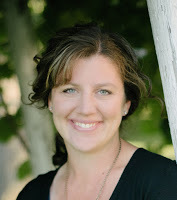Advice for an Aspiring Author
Gabrielle Here:
Facebook reminded me that four years ago this week, I met Beverly Lewis in person. She was the first big-name author I had met and it was only a few months after I had decided to pursue my dream to be a published author.

To say I was nervous is an understatement.
Beverly had drawn a big crowd of reader fans, and during the course of her talk, she asked if there were any questions from the audience. People all around me asked general questions about her books, her life, and the inspiration behind her characters.
I timidly raised my hand and asked one of the most popular questions an author receives: "What advice do you have for an aspiring writer?"
Little did I know I would be asked that same question countless times in the years to follow. I also didn't know that her advice was just the tip of the iceberg for all I had to learn.
Here is Beverly's advice, and what I've learned in the four years since then:
1. Read and write as much as you can. I would go a bit further and say that you should be well-read in the particular genre you want to write. For years, I lived and breathed historical romance--and still do. Reading extensively in that genre helped me develop a "historical" voice. It helped with my vocabulary, turn of phrase, and general "feel" of a historical novel. Many people also recommend that you read extensively outside your genre to get a feel for the industry and what's popular, etc. I would agree with them--but I'm not great about doing this. When it comes to my reading time, I would choose a historical romance novel any day of the week.
As far as writing goes--yes! Write as much as possible. I often tell people I had almost a million words written in story form before my first novella (20,000 words!) was published. It's in the process of writing, and re-writing, that we find our voice, strengthen our weaknesses, and learn how to tell a good story.
2. Join a critique group. Oh, my, this is an important piece of advice! At the time, I didn't have any writing friends, but now I couldn't live without them. Not only do they make your writing better, but they become essential to lean on for support and fellowship. I thank God for my writing buddies. They are the first people I go to with my writing failures and successes. These people don't even have to be critique partners, they can just be good writing friends. This past weekend, Erica came to my house so we could read through our next novella collection, and the time we shared together was priceless. We laughed, talked, and worked--and the time flew by. In the process, she taught me so many valuable things I will use as I write my next story. Join a critique group, but more importantly, make writing friends.
3. Attend a conference, meet editors, and find out what they are looking for. Again, great advice. I attend the ACFW Conference every year, and hopefully I can attend RWA in the coming years. Conferences are great for networking (finding those writing friends!), meeting editors and agents, and educating yourself about the industry. Conferences are a great investment of time and money. I have made so many important connections at ACFW--both personally and professionally. If you have the money, and you're on the fence about attending, my advice would be to go. There's really no way to over-emphasize the importance of face-to-face meetings. I had an editor tell me that she won't publish an author until she's met her in person.
4. Write from the heart. The oldest advice in the writing world is to write what you know--which translated means: write from the heart. I have an incredible passion for my hometown and state. I love the history, the culture, the climate, and the people (both past and present). I know there are other places more interesting, more beautiful, and more appealing--but this is where my heart belongs and I have the ability to make it interesting, beautiful, and appealing when I write through the lenses of my perspective. It's a lot easier to write from my heart than it is to write from my head.
5. Spend a great deal of time in prayer. I couldn't agree with Beverly more. Writing is an act of worship for me. God has anointed me to write and He's entrusted me with words--which have the power of life and death in them. I don't take this responsibility lightly. Words are like seeds, and I want to make sure I'm planting good seeds into the heart soil of those who read my stories. Prayer is essential in all aspects of the writing journey, from the moment a story idea is conceived, to the moment it's published, it should be approach in prayer.
I would add one more piece of advice to an aspiring author:
6. Educate yourself on the writing industry. Not just at conferences, but through writing blogs, books, workshops, online classes, and mentors. There's so much to know about publishing (both traditional and independent). After you learn how to write a good story, you must know how to find an agent and get that story in the hands of editors. It's important to know the stages a manuscript goes through at a publishing house, what happens when you're contracted, how to market a book, how to use social media, how to track sales numbers, what an advance is, how much you can expect to earn, and on and on. There's no end to what you need to know. I'm learning something new almost every day. If you don't know where to begin, ask an author to point you in the right direction! Most authors I know are eager to help.
Your Turn: If you're an author, what advice do you give to aspiring writers? If you're a writer-wannabe, what would you like to know?
I have a winner from last Thursday's big announcement! The winner of an advance copy of Seven Brides for Seven Texans Novella Collection is: Jan Hall! Congratulations, Jan. I'll be in touch. :)
Gabrielle Meyer
Find me on Facebook
Find me on Pinterest
Find me on Twitter
Find me on Amazon
Find me on Goodreads
Find me on My Website

Facebook reminded me that four years ago this week, I met Beverly Lewis in person. She was the first big-name author I had met and it was only a few months after I had decided to pursue my dream to be a published author.

To say I was nervous is an understatement.
Beverly had drawn a big crowd of reader fans, and during the course of her talk, she asked if there were any questions from the audience. People all around me asked general questions about her books, her life, and the inspiration behind her characters.
I timidly raised my hand and asked one of the most popular questions an author receives: "What advice do you have for an aspiring writer?"
Little did I know I would be asked that same question countless times in the years to follow. I also didn't know that her advice was just the tip of the iceberg for all I had to learn.
Here is Beverly's advice, and what I've learned in the four years since then:
1. Read and write as much as you can. I would go a bit further and say that you should be well-read in the particular genre you want to write. For years, I lived and breathed historical romance--and still do. Reading extensively in that genre helped me develop a "historical" voice. It helped with my vocabulary, turn of phrase, and general "feel" of a historical novel. Many people also recommend that you read extensively outside your genre to get a feel for the industry and what's popular, etc. I would agree with them--but I'm not great about doing this. When it comes to my reading time, I would choose a historical romance novel any day of the week.
As far as writing goes--yes! Write as much as possible. I often tell people I had almost a million words written in story form before my first novella (20,000 words!) was published. It's in the process of writing, and re-writing, that we find our voice, strengthen our weaknesses, and learn how to tell a good story.
2. Join a critique group. Oh, my, this is an important piece of advice! At the time, I didn't have any writing friends, but now I couldn't live without them. Not only do they make your writing better, but they become essential to lean on for support and fellowship. I thank God for my writing buddies. They are the first people I go to with my writing failures and successes. These people don't even have to be critique partners, they can just be good writing friends. This past weekend, Erica came to my house so we could read through our next novella collection, and the time we shared together was priceless. We laughed, talked, and worked--and the time flew by. In the process, she taught me so many valuable things I will use as I write my next story. Join a critique group, but more importantly, make writing friends.
3. Attend a conference, meet editors, and find out what they are looking for. Again, great advice. I attend the ACFW Conference every year, and hopefully I can attend RWA in the coming years. Conferences are great for networking (finding those writing friends!), meeting editors and agents, and educating yourself about the industry. Conferences are a great investment of time and money. I have made so many important connections at ACFW--both personally and professionally. If you have the money, and you're on the fence about attending, my advice would be to go. There's really no way to over-emphasize the importance of face-to-face meetings. I had an editor tell me that she won't publish an author until she's met her in person.
4. Write from the heart. The oldest advice in the writing world is to write what you know--which translated means: write from the heart. I have an incredible passion for my hometown and state. I love the history, the culture, the climate, and the people (both past and present). I know there are other places more interesting, more beautiful, and more appealing--but this is where my heart belongs and I have the ability to make it interesting, beautiful, and appealing when I write through the lenses of my perspective. It's a lot easier to write from my heart than it is to write from my head.
5. Spend a great deal of time in prayer. I couldn't agree with Beverly more. Writing is an act of worship for me. God has anointed me to write and He's entrusted me with words--which have the power of life and death in them. I don't take this responsibility lightly. Words are like seeds, and I want to make sure I'm planting good seeds into the heart soil of those who read my stories. Prayer is essential in all aspects of the writing journey, from the moment a story idea is conceived, to the moment it's published, it should be approach in prayer.
I would add one more piece of advice to an aspiring author:
6. Educate yourself on the writing industry. Not just at conferences, but through writing blogs, books, workshops, online classes, and mentors. There's so much to know about publishing (both traditional and independent). After you learn how to write a good story, you must know how to find an agent and get that story in the hands of editors. It's important to know the stages a manuscript goes through at a publishing house, what happens when you're contracted, how to market a book, how to use social media, how to track sales numbers, what an advance is, how much you can expect to earn, and on and on. There's no end to what you need to know. I'm learning something new almost every day. If you don't know where to begin, ask an author to point you in the right direction! Most authors I know are eager to help.
Your Turn: If you're an author, what advice do you give to aspiring writers? If you're a writer-wannabe, what would you like to know?
I have a winner from last Thursday's big announcement! The winner of an advance copy of Seven Brides for Seven Texans Novella Collection is: Jan Hall! Congratulations, Jan. I'll be in touch. :)
Gabrielle Meyer
Find me on Facebook
Find me on Pinterest
Find me on Twitter
Find me on Amazon
Find me on Goodreads
Find me on My Website

Published on April 21, 2016 05:00
No comments have been added yet.



